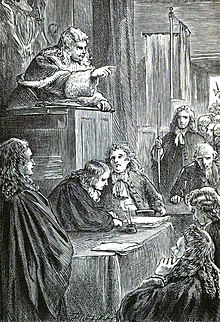Bloody Assizes
[5][4] Of more than 500 prisoners brought before the court at Taunton between 17 and 19 September, 144 were hanged and their remains displayed around the county to ensure people understood the fate of those who rebelled against the king.
[6] Some 800–850 men were transported to the West Indies[2] where they were worth more alive than dead as a source of cheap labour[7] (the novel Captain Blood, and the later movies based on it, graphically portray this punishment).
Others were imprisoned to await further trial, although many did not live long enough, succumbing to 'Gaol Fever' (typhus), which was rife in the unsanitary conditions common to most English gaols at that time.
[8] Jeffreys returned to London after the Assizes to report to King James, who rewarded him by making him Lord Chancellor (at the age of only 40), 'For the many eminent and faithful services to the Crown'.
Writing as recently as 1929, Sir John C. Fox[9] said: Even to the present day, the mothers of West Somerset control their unruly offspring by threatening to send for 'Judge Jeffreys'.

